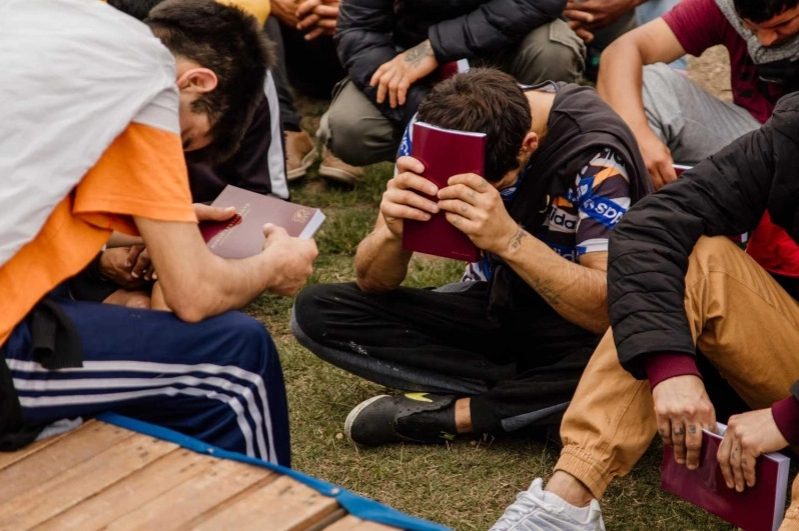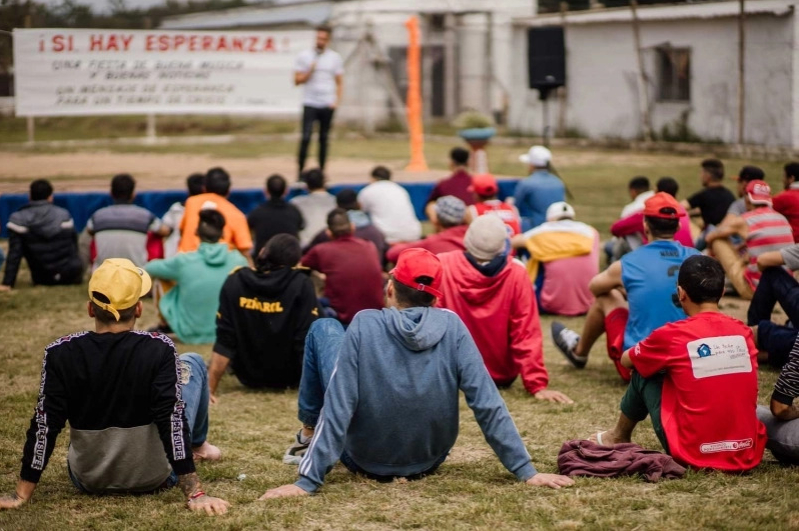
“Six out of ten Uruguayans prefer to invest more in the rehabilitation of inmates and their social reintegration than in allocating money for the construction of more prisons,” a recent issue of Prison Insider, an Uruguayan publication, stated. But at the same time, “only one in four see it possible to rehabilitate all or, at least, most of the people who commit crimes,” according to a study on Justice, Prisons and Rehabilitation.
Yet, an evangelical ministry seeks to help change attitudes as they bring hope and “spiritual freedom” to prisoners – and the impact has been remarkable.
Unit 7 of Uruguay's National Rehabilitation Institute (INR) is known as the Canelones Prison. For its director Ana Germán, “there is no them and us. It is all of us.” The difference? The country's penitentiary ministry allowed the construction of a chapel inside the prison and a group of evangelical Christians regularly visit and provide spiritual counseling to the inmates.
The effort is led by Pastor Eduardo Vignoli, accompanied by his sons, Pablo and Juan, all of whom are leaders in the Uruguayan pastoral ministry. The Vignoli family is considered the spiritual authority in charge of chaplaincy to those who have been deprived of liberty. And thanks to their work, there is now a place of worship within the prison.
“We started in February 2002. But there have always been brothers who have been interested in this ministry,” Vignoli told Diario Cristiano, Christian Daily International’s Spanish edition. “The Prison Fellowship has brothers from different congregations working in all the penitentiary units of the country. There are about 33 in total. There are churches that take care of the 'liberated' who have made a decision for Christ in the prisons.”

The pastor remarked that "the director of the INR, on which the prisons and penitentiaries depend, firmly believes in and supports the work of the churches. There is a protocol of religious attention in the prisons drafted by the different religious expressions and approved by the INR,” which endorses spiritually accompanying and assisting the inmates.
Within the premises of the Canelones Prison, there is a simple church with the necessary facilities to hold meetings, some private spaces for counseling, and a place where inmates can worship God together. “From the beginning of the construction of the church, the response from and relationship with the prison authorities has been very good. And it continues to be excellent with the current leadership of the Unit,” says Vignoli, who took the lead in requesting the construction of the prison church.
The chaplain says that “the land was obtained with the Ministry of the Interior, through the Division of Architecture and with the authorization of the director at that time, who was a great promoter of the project. Brethren from the churches and inmates participated in obtaining the money. A miracle that is still unexplainable. There was no contribution from the outside.”
Vignoli adds that they started with “a few coins”, and highlights that “several inmates learned the construction trade as they helped build the church. And today several of them make a living as bricklayers.”
“The general population, those in construction trades, and others looked at it positively and supported the work in various ways. The older officials viewed it with skepticism and some apprehension. The inmates were curious," the pastor recalls.
Asked how he relates to the prison population, Vignoli emphasizes that the work he does as chaplain is very personal and that “he simply invites the inmate to have a better life.” He explains to them that “the prison is not the place for them” and so “Jesus is presented as the one who can help them” in their situation. “If he accepts that, he is invited to approach a real church or participate in rehabilitation groups.”
Families, too, are approached sensitively, if and when those who remain in confinement request it. “To the extent that they allow it, we work with the inmates’ families wherever possible. If he has family and if they accept him, we work with them towards restoring broken relationships,” Vignoli says.
The total population currently held in the Canelones Prison is approximately 1,000 men, although officially it is only prepared for about 800. This is something that prison authorities and the ministry have some disagreements about.
Although they didn’t specify the exact number of people who attend the evangelical service, the ministry says that members of the spiritual ministry led by Vignoli visit all those who have agreed to receive spiritual help at least once a week. “We go on Mondays, Wednesdays and Fridays, each day a different group, but coordinated. During the week we see practically everyone once and some of them twice,” says the pastor.
In the rehabilitation of the inmates, the shift to seeing themselves as a dignified person is a process that often requires changes that they themselves do not want to address, Vignoli explains.
“But when they manage to cross those boundaries, they understand that Jesus came to them so that they may have life and have it in abundance, even inside the prison serving a sentence as a result of their sinful acts, for which they are no longer condemned by God.”
“There are those who have already come to enjoy a spiritual freedom that only God can offer to human beings, and there are those who are in the process of getting to know what this freedom is all about,” he says.Originally published in Spanish on Diario Cristiano.





